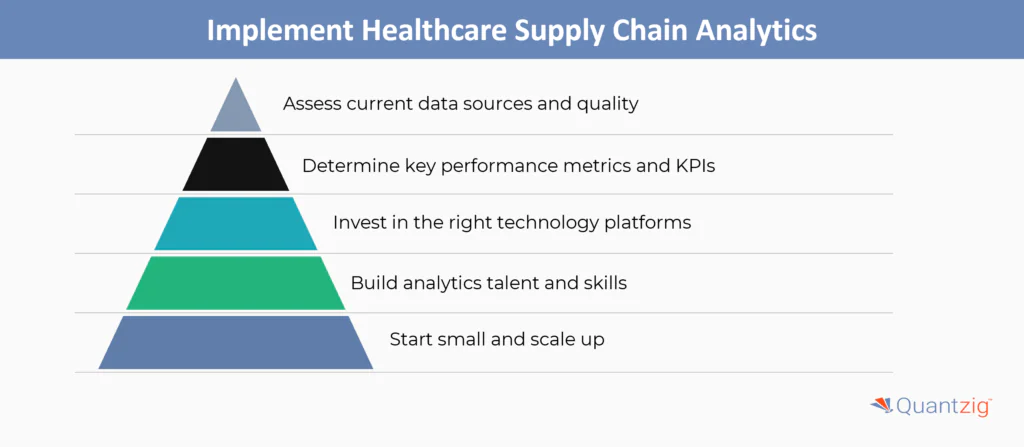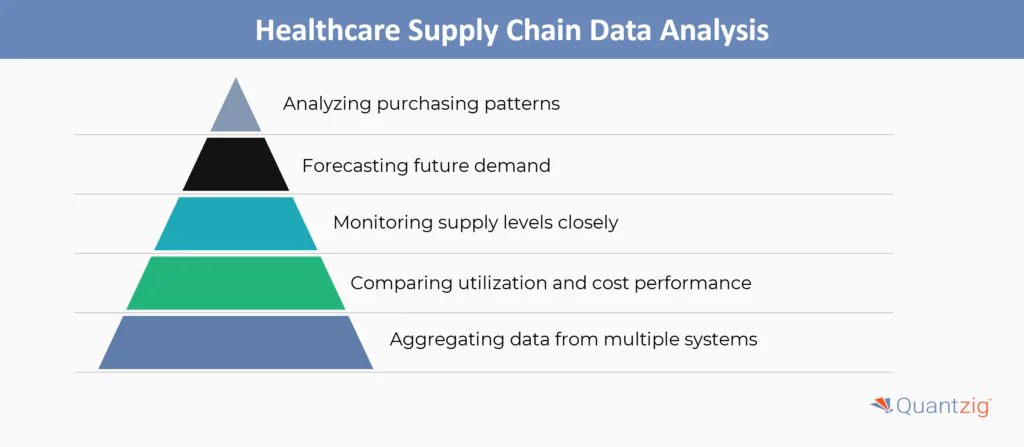Table of Contents
Table of Contents
- Introduction
- What is Supply Chain Analytics in Healthcare?
- Quantzig’s Expertise in Healthcare Supply Chain Analytics Solution
- How are Healthcare Businesses Using Supply Chain Data?
- Ways to Implement Supply Chain Analytics in Healthcare
- Strategies for Analytics Excellence in Healthcare Supply Chains
- Conclusion
Author: Associate Vice President, Analytics and Data Strategy, Quantzig.
Introduction to Supply Chain Analytics in Healthcare
Healthcare organizations are increasingly leveraging supply chain analytics to drive efficiency and optimize operations. In this case study, we explore how a leading US healthcare provider harnessed data-driven insights to transform its logistics and improve overall supply chain performance. By applying advanced analytics techniques, the organization was able to identify and address key pain points, streamline operations, enhance visibility, and deliver better patient care at a lower cost. This case study underscores the immense potential of supply chain analytics in healthcare, offering valuable guidance for leaders seeking to harness the power of data-driven decision-making and drive sustainable improvements in their supply chain operations.
Book a demo to experience the meaningful insights we derive from data through our analytical tools and platform capabilities. Schedule a demo today!
Request a Free DemoWhat is Supply Chain Analytics in Healthcare?

Supply chain analytics in healthcare refers to the use of data analysis techniques and technologies to optimize various processes within the healthcare supply chain, from procurement to distribution. By leveraging insights derived from historical data, predictive models, and real-time tracking, healthcare organizations can make more informed decisions to reduce costs, enhance inventory management, and ensure the timely availability of critical medical supplies and equipment. Ultimately, the strategic application of supply chain analytics enables healthcare providers to improve operational efficiency, mitigate risks, and deliver better patient care.
Quantzig’s Expertise in Healthcare Supply Chain Analytics Solution for a Leading US Healthcare Partner
| Particulars | Description |
| Client | Our client, a leading US healthcare partner, was struggling with rising cost pressure due to inventory runouts and supply chain data silos. |
| Business Challenge | This client suffered severe supply chain disruptions, interrupted by shortages of vital medical equipment and supplies. |
| Impact | Quantzig’s optimized demand forecasting technique helped our client analyze multiple datasets to c and thus optimize its supply chain. |
Healthcare Supply Chain Analytics Challenges Faced by the Client
A leading US healthcare partner struggled with rising cost pressure due to inventory runouts and supply chain data silos. The client’s business was being negatively impacted due to its reliance on the traditional healthcare supply chain management. The traditional supply chain has become ineffective due to the involvement of several inconvenient processes that result in operational inefficiencies.
Our client was struggling with severe supply chain disruptions, resulting in shortages of vital medical equipment and supplies. Our client was struggling with the following supply chain challenges:
- High Inventory holding costs
- Stock outs
- Lack of structured data
- Logistics inefficiency
The client, thus, reached out to Quantzig to develop a data-driven solution to eliminate inefficiencies, improve customer satisfaction, pre-empt bottlenecks, and drive innovation and growth.
Healthcare Supply Chain Analytics Solutions Offered by Quantzig
- Quantzig provided the client with a data-driven analytical framework that kept the customers at the forefront at every stage of the supply chain. Our focus was on inventory optimization, predictive analysis, and warehouse optimization using artificial intelligence to analyze massive data volumes.
- At the supply stage, predictive analytics helped our healthcare partner assess customer health history to ensure the availability of medical supplies. Quantzig’s AI-driven solutions provided more precise supply forecasts by integrating several analytical techniques and defining new algorithms over time. This allowed the client to reduce stock-outs and minimize damaged and expired inventory.
- As we identified discrepancies in the distribution process, our solutions offered multiple distribution channels to overcome this challenge, including same-day pickup, in-store delivery, and overnight delivery.
Get started with your complimentary trial today and delve into our platform without any obligations. Explore our wide range of customized, consumption driven analytical solutions services built across the analytical maturity levels.
Start your Free TrialImpact Analysis of Quantzig’s Healthcare Supply Chain Analytics Solutions
Our AI system leveraged customer insights that helped our client run successful clinical trials, drug analysis, product launches, and inventory management. Our solution was much more effective and convenient than traditional solutions used to analyze product demand. Quantzig’s optimized demand forecasting techniques helped the client analyze multiple datasets to implement real-time visibility. Our solutions enabled the client to unlock the following benefits.
- Increased profit margin by approximately 10% as supply expenses decreased by 17.7%.
- Our customer analytics framework helped improve the success rate of clinical trials by 10%.
Key Outcomes
Quantzig’s experts used advanced modeling techniques to create a realistic model of the supply chain network, taking into consideration all aspects. Quantzig’s supply chain optimization solutions are designed to cater to the needs of its customers in keeping with the demands of the healthcare industry. These data-driven insights would help to streamline the supply chain leading to higher profit margins and consistent growth for the client in an otherwise very volatile industry.
Experience the advantages firsthand by testing a customized complimentary pilot designed to address your specific requirements. Pilot studies are non-committal in nature.
Request a Free PilotHow are Healthcare Businesses Using Supply Chain Data?
Healthcare organizations are increasingly leveraging supply chain data and analytics to optimize operations, reduce costs, and improve patient care. Some keyways they are using this data include:
- Analyzing purchasing patterns to identify predictable needs for certain supplies by department and negotiate better contracts with vendors
- Forecasting future demand more accurately based on historical usage data to minimize waste and ensure availability of critical supplies
- Monitoring supply levels closely to detect potential shortages and take proactive measures to mitigate risk
- Comparing utilization and cost performance across different providers and locations to identify opportunities for standardization and savings
- Aggregating data from multiple systems like ERP, EHR, and financial systems to get a comprehensive view of supply chain performance metrics
Ways to Implement Supply Chain Analytics in Healthcare

To successfully implement analytics in the healthcare supply chain management, organizations need to take a strategic approach:
- Assess current data sources and quality. Identify all relevant data across systems and address any gaps or inconsistencies.
- Determine key performance metrics and KPIs. Align analytics initiatives with strategic supply chain goals and define the metrics that matter most.
- Invest in the right technology platforms. Cloud-based ERP and SCM solutions with advanced analytics capabilities can put powerful insights in the hands of supply chain teams.
- Build analytics talent and skills. Supply chain managers need to understand how to interpret and apply analytics to drive business decisions.
- Start small and scale up. Pilot analytics projects in specific areas first, demonstrate value, and then expand the scope over time.
By harnessing the power of supply chain data and analytics, healthcare organizations can make more informed, data-driven decisions to optimize inventory, reduce costs, and ultimately deliver better patient care. While implementing analytics requires an upfront investment, the potential returns in terms of efficiency gains and cost savings are significant.
Strategies for Analytics Excellence in Healthcare Supply Chains

To achieve analytics excellence and drive tangible improvements in healthcare supply chain performance, organizations should focus on the following key strategies:
- Break down data silos. Empower everyone in your supply chain with self-service analytics for all-around agility and resilience. Integrate data from disparate systems like ERP, EHR, and WMS to get a comprehensive view.
- Establish a solid data foundation. Identify all relevant data sources, address data quality issues, and implement mechanisms to maintain data integrity. Invest in cloud-based ERP solutions with advanced analytics capabilities.
- Leverage predictive analytics. Use machine learning and AI to forecast demand, prevent shortages, and optimize inventory levels.
- Standardize products and reduce variation. Analyze utilization and cost data to identify opportunities for standardization and cost savings. Negotiate better contracts with vendors based on aggregated purchasing patterns.
- Empower supply chain teams with data. Provide supply chain managers with the skills and tools to interpret analytics and apply insights to drive business decisions. Visualize data through interactive dashboards for better decision-making.
- Start small and scale up. Pilot analytics projects in specific areas first, demonstrate value, and then expand the scope over time. Focus on use cases that deliver quick wins and build momentum for further adoption.
By embracing these strategies, healthcare organizations can harness the power of supply chain analytics to optimize inventory, reduce costs, and ultimately deliver better patient care. The path to analytics excellence requires a combination of the right technology, data, and talent – but the potential returns are significant.
Get started with your complimentary trial today and delve into our platform without any obligations. Explore our wide range of customized, consumption driven analytical solutions services built across the analytical maturity levels.
Start your Free TrialBroad Perspective on the role of SCM Solutions in Healthcare Industry
Pharmaceutical companies are increasingly embracing customer-centric supply chain management technology to keep the customer at the center of the healthcare ecosystem. Medical device manufacturers, healthcare providers, pharmaceutical companies, and other organizations work collaboratively to achieve coordinated, customer-centric results. Healthcare supply chains are projected to grow rapidly by delivering sophisticated and customer-centric treatment regimes. Additionally, healthcare organizations experience increasing pressure to invest in digital technologies and digital transformation efforts due to the upheaval caused by the pandemic.
Conclusion
Supply chain analytics in the healthcare industry is revolutionizing global supply chain management through advanced data analysis and predictive capabilities. Leveraging AI (Artificial Intelligence) and ML (Machine Learning), healthcare organizations can optimize supply chains by utilizing comprehensive data streams and sophisticated data visualization. These technologies enable efficient digital operations, enhancing overall efficiency and ensuring timely delivery of medical products. Quantzig’s expertise in virtual sales analytics and digital transformation supports the Healthcare LifeSciences sector in making data-driven decisions, ultimately improving patient outcomes and operational effectiveness.




